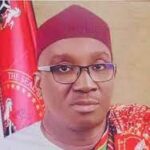Civil Society Organisations (CSOs) in the environment sector have prioritised areas the newly appointed Director General (DG) of the National Council on Climate Change (NCCC), Dr Salisu Dahiru, should focus on towards ameliorating the environment which has been battered by climate crises.
Nigeria has been experiencing flooding, excessive heat, irregular rain patterns, rising sea levels, among other climate change-induced natural phenomena in recent years.
As part of measures to mitigate the impacts of climate change, President Muhammadu Buhari, last November, signed into law the Climate Change Act which paved way for the appointment of a DG to run the affairs of the NCCC and its subsequent inauguration.
Dr Dahiru was last week Friday appointed as pionner DG by President Buhari, with the appointment taking effect on July 25.
Dr David Michael Terungwa, Africa Regional Coordinator of Citizens Climate International and Executive Director, Global Initiative for Food Security and Ecosystem Preservation (GIFSEP), while commending the appointment of Dr Dahiru, stated that the long delay in the implementation of the Climate Change Act was not necessary considering its importance.
He said, “The delay in implementing the Climate Change Act was unnecessary, especially now that we officially have less than seven years to act to keep global warming below 1.5 degree Celsius (1.5°C) as enshrined in the 2015 Paris Agreement. Urgent action is required more than ever before to deal with the increasing risks of climate change across the globe.
“From every indication, it is indeed evidently clear that the global commitments from government leaders and industries are not on track to meet the 1.5°C climate target. People all over the world are already suffering from catastrophic losses as a result of extreme weather events. The record-breaking #Heatwave2022 is one classic evidence in this regard.”
He, therefore, urged the pioneer DG to operate an open-door policy, as well as evolve programmes and strategies to strengthen accountability of government on the implementation of the Climate Change Act.
He further said, “Also, the Climate Change Act should not be seen as an act for the federal government alone, as it is the case with implementation of other environmental laws in Nigeria. I charge the DG to begin without delay the involvement and engagement of state and local governments as clearly stated in the act.
“The activities heralding the 2023 general elections are already gathering momentum, and if you listen to all the political parties and all the campaigns, you hardly hear anything about climate change and the environment.”
Gloria Bulus, Executive Director of Bridge That Gap Initiative, a Kaduna-based non-profit organisation, congratulated the DG, saying the appointment was quite timely.
She said, “There is quite a huge task ahead of him looking at the alarming rate the impacts of climate change are being felt in Nigeria.
“For me, when he is addressing the impact of climate change, the rural people should not be left behind in terms of decision making, and I hope the implementation of the policies will not just be done at the national level. In most cases, when environmental issues come up, decision making is always done at the national without looking at state and local governments. So our expectation is that the implementation of the Climate Change Act will start from the communities up to the national.”
She stressed that the climate solutions must be community-centred in order to effectively address the climate change crises in the country.
Meanwhile, the Society of Landscape Architects of Nigeria (SLAN) has warned against degradation of the vegetable and grain belt known as the Savannah Zone in the country.
The experts noted that the destruction of the Savannah Zone could cause spread of diseases, short life span, soil degradation and food shortage in human communities.
Speaking at a two-day workshop on the theme: “Save The Nigerian Savannah: Addressing Climate Change”, the President of SLAN, Mr Bartho Ekweruo, noted that human activities had greatly affected the Savannah Zone over the years.
Ekweruo recalled that savannah regions used to enhance food production, citing the Kano groundnut pyramids as products of green vegetation.
He said, “In the last three or four decades, the unique livestock, vegetable and grain belt known as the savannah region is characterised by critical soil degradation, desert encroachment, desertification, poor pastoral and arable farm activities in the frontline areas, while the Southern part experiences continuous deforestation, massive flooding, land scarification and degradation in abandoned mine areas, erosion and destruction of riparian and aquatic systems, hence gross regional impoverishment, constant community clashes and loss of biodiversity.”
In a statement announcing the appointment of Dahiru as DG of NCCC, Saghir el-Mohammed, spokesman of the Federal Ministry of Environment, said President Buhari expected the DG to drive implementation of Nigeria’s Climate Change Agenda and the National Climate Change Action Plan, including the development of a carbon market framework and a National Adaptation Plan, which will be in sync with the aspirations enshrined in the Nationally Determined Contributions (NDCs).
Dahiru holds a BSc in botany, MSc in cytogenetics and plant breeding and PhD in environmental resources management. He has 37 years of cognate experience in environmental management, sustainable development and the academia, of which over 14 years were spent in climate change policy, programmes and projects at national and international levels. He pioneered and led Nigeria’s Reducing Emissions from Deforestation and Forest Degradation (REDD) programme, as well as has been Nigeria’s lead negotiator for the Agriculture, Forest and Other Land Use (AFOLU) under the United Nations Framework Convention on Climate Change (UNFCCC).
Prior to his appointment, he was the National Project Coordinator of both the Nigeria Erosion and Watershed Management Project (NEWMAP) and the Agro-Climatic Resilience in Semi-Arid Landscape (ACReSAL); both financed by the World Bank. He also served as the Federal Director of Forestry for eight years. He is a Fellow of the Forestry Association of Nigeria (FAN).

 Join Daily Trust WhatsApp Community For Quick Access To News and Happenings Around You.
Join Daily Trust WhatsApp Community For Quick Access To News and Happenings Around You.


